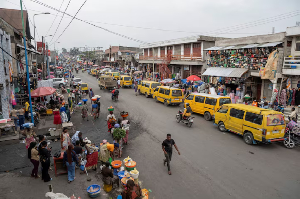Ghana’s domestic borrowing costs, the highest in Africa, probably won’t get a reprieve from a resurgent currency as investors look for protection against rising inflation rates.
Yields at Friday’s weekly auction of benchmark 91-day Treasury bills were little changed from an almost five-year high of 25.7 percent a week ago. Consumer prices accelerated for a 12th month to 15.9 percent in August, with September data out next week. Ghanaian banks use three-month yields in deciding lending rates.
“The market’s inflation expectations remain high,” Angus Downie, head of economic research at Ecobank Transnational Inc. in London, said in an e-mailed response to questions on Oct. 8. “These are influencing their bids at the weekly auction.”
The budget deficit, forecast by the International Monetary Fund at 9.75 percent of gross domestic product in 2014, and demand for dollars by importers led to a 32 percent slide in the cedi against the dollar over the past 12 months, Africa’s worst performance. A decision by the government to start talks with the IMF on aid, as well as the sale of $1billion in Eurobonds that bolstered foreign-exchange reserves, shored up the currency. It gained 17 percent since the end of August.
That probably won’t be enough to curb inflation and convince investors to bid yields lower, said Anthony Kofi Asare, head of treasury at GCB Bank Ltd., Ghana’s biggest bank by branches.
“We’re still having earlier pressures from currency depreciation on prices,” he said by phone yesterday. “Inflationary pressure on cedi interest rates is a big factor.”
The cedi was unchanged at 3.2165 per dollar at 5:36 p.m. in Accra after two days of gains. The Ministry of Finance postponed an auction of 400 million cedis ($124 million) of three-year bonds this month, the central bank said in a statement on its website yesterday.
Business News of Sunday, 12 October 2014
Source: Bloomberg













